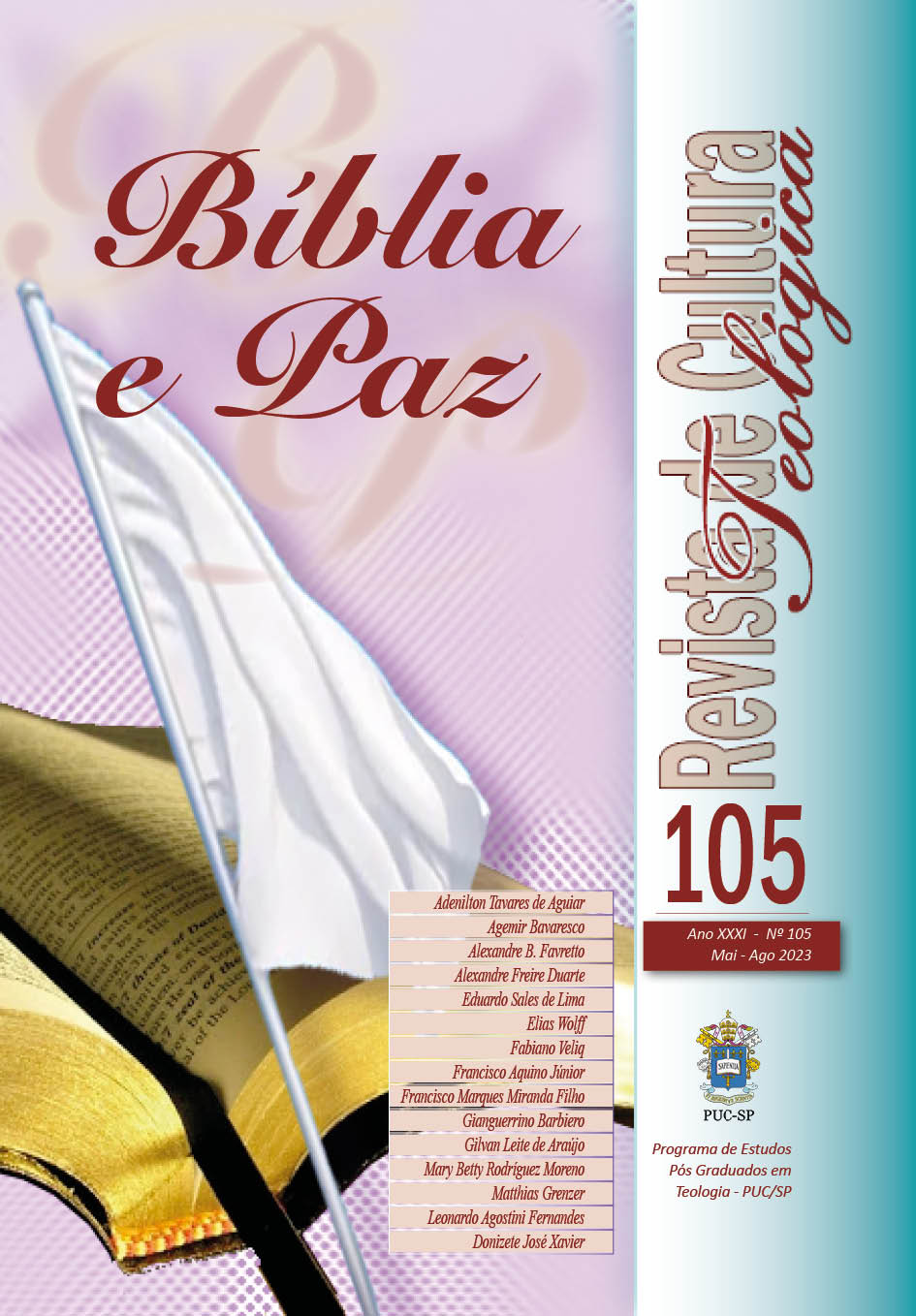Paz no coração do conflito
Uma leitura de Jo 20,19-21
DOI:
https://doi.org/10.23925/rct.i105.62892Palavras-chave:
comunidade, memória, conflito, cruz, pazResumo
El siguiente artículo, pretende ubicar contextualmente las palabras de Jesús en Jn 20,19-21, en el contexto de conflicto que se desarrolla a lo largo del Evangelio entre Jesús y sus adversarios. Asimismo, subrayar que hay un recurso a la memoria, un acercamiento al conflicto, a la paz que Jesús ofrece y los signos de la paz que presenta el evangelista. Lo anterior, con el ánimo de destacar la necesidad de releer la paz para la realidad actual, según el Evangelio, que le apuesta a la inclusión y al valor de la diversidad.
Referências
AGUIRRE, Rafael. “La segunda generación y la conservación de la memoria de Jesús: el surgimiento de los evangelios”. En Así empezó el cristianismo. Rafael Aguirre (ed), pág.195-254, Estella (Navarra), Verbo Divino, 2010.
ABREU O., José María. “Una Lectura política del Evangelio según San Juan”. https://mercaba.org/K/asagrada%20escritura/Una%20lectura%20pol%C3%ADtica%20del%20Evangelio.htm Acceso marzo 4 de 2023.
ANDERSON, Paul. “The community that Raymond Brown left behind: reflections on the Johannine dialectical situation”. En Communities in Dispute: Current Scholarship on the Johannine Epistles, R. Alan Culpepper and Paul N. Anderson (Eds), pág. 47-93. Atlanta, SBL Press, 2014.
BEUTLER, Johannes, Comentario al Evangelio de Juan, Estella (Navarra), Verbo Divino, 2016.
BERNABÉ UBITA, Carmen. Qué se sabe de María Magdalena. Estella (Navarra), Verbo Divino, 2020.
BROWN, Raymond E. La comunidad del discípulo amado. Estudio de la eclesiología Juánica. Salamanca, Sígueme, 1987.
BROWN, Raymond E. El evangelio según Juan I-XII. Madrid, Cristiandad, 1999.
Byrne, Pauline. “That you may come to believe that Jesus is the Messiah (John 20)”. The Downside Review 135/2, pág. 99-110, 2017.
CARTER, Warren. John and Empire. Initial Explorations. New York-London, T&T Clark, 2008.
CROATTO, José Severino. Hermenéutica bíblica. Buenos Aires (Argentina), Ediciones Aurora, 1984.
CROATTO, José Severino. Liberación y libertad. Pautas hermenéuticas. Lima (Perú), CEP, 1978.
ESTES, Douglas Charles. The Questions of Jesus in John: Logic, Rhetoric and Persuasive Discourse. Leiden, Brill, 2012.
DE LA TORRE GUERRERO, Gonzalo. Evangelio de Juan. La fe en Jesús es capaz de reconstruir o re-crear al ser humano. Fundación Universitaria Claretiana, Quibdó (Colombia), 2007.
GIL ARBIOL, Carlos. Los valores negados. Ensayo de exégesis socio-científica sobre la autoestigmatización en el movimiento de Jesús. Estella (Navarra), Verbo Divino, 2003.
GIRÓN IZQUIERDO, Jesús. Maestro, ¿dónde vives? (Jn 1,38). Estudio exegético-teológico sobre la función del adverbio «ποῦ» en el evangelio de Juan. Estella (Navarra), Verbo Divino, 2019.
GRASSO, Santi. Il Vangelo di Giovanni. Commento esegetico e teologico. Roma, Cittá Nuova Editrice, 2008.
GUIJARRO OPORTO, Santiago. “El impulso creativo de la memoria de Jesús en la tradición Joánica”. Revista Bíblica 1-2, pág. 17-28, 2013.
HONG, Ji Young Emiliano. Análisis narrativo del evangelio según san Juan. Estudio del discurso joánico: memoria, testimonio, diálogo. Extracto de la tesis doctoral presentada en la Facultad de Teología de la universidad de Navarra. Pamplona, pág. 86-135, 2005.
KOBEL, Esther. Dining with John: Communal Meals and Identity Formation in the Fourth Gospel and its Historical and Cultural Context. Leiden, Brill, 2011.
MATEOS Juan y Juan BARRETO. El Evangelio de Juan. Análisis lingüístico y comentario exegético. Madrid, Cristiandad, 1982.
MENA LÓPEZ, Maricel. “Cuerpo y espiritualidad: Para una comprensión del cuerpo de Jesús en el Prólogo de Juan.” Siwôʼ Revista de Teología/Revista de Estudios Sociorreligiosos 8/1, pág. 1-29, 2014.
MIQUEL PERICAS, Esther. Qué se sabe de El Nuevo Testamento desde las ciencias sociales. Estella (Navarra), Verbo Divino, 2011.
MOLONEY, Francis. El evangelio de Juan. Estella (Navarra), Verbo Divino, 2005.
RIVAS, Luis Heriberto. “El conocimiento de Dios en el evangelio de san Juan”. Revista Teología. Tomo L 114, pág. 171-181, 2014.
RUBEAUX, Francisco. “Las raíces del Cuarto Evangelio”. RIBLA. Revista de Interpretación bíblica latinoamericana 22, pág. 58-70, 1996.
TRAGAN, Pius-Ramon y PERRONI, Marinella. Nadie ha visto nunca a Dios. Una guía para la lectura del evangelio de Juan. Estella (Navarra), Verbo Divino, 2019.
VIDAL, Senén. Los escritos originales de la comunidad del discípulo «amigo» de Jesús. Salamanca: Sígueme, 1997.
SHEPPARD, Beth M. “The Fourth Gospel, Romanization, and the Role of Women”. En An Introduction to Empire in the New Testament, por Adam Winn (ed.). 123-142 Atlanta: Society of Biblical Literature. 2016.
UNZURRUNZAGA HERNÁNDEZ, Ana. “Las mujeres como portadoras y creadoras de memoria en los orígenes (Lc 24,1-11)”. En Con ellas tras Jesús. Mujeres modelos de identidad cristiana., por Carmen Bernabé Ubieta (ed.). 77-117. Estella (Navarra): Verbo Divino, 2010.
VIDAL, Senén. Evangelio y cartas de Juan. Génesis de los textos juánicos. Bilbao (España): Ediciones Mensajero, 2013.
WILLIAMS, Catrin H. “Patriarchs and Prophets Remembered: Framing Israel’s Past in the gospel of John”. En Abiding Words: The Use of Scripture in the Gospel of John. Alicia D. Myers y Bruce G. Schuchard (eds) 187-212. Atlanta: SBL Pres
Downloads
Publicado
Como Citar
Edição
Seção
Licença
Copyright (c) 2023 Revista de Cultura Teológica

Este trabalho está licenciado sob uma licença Creative Commons Attribution-NonCommercial-NoDerivatives 4.0 International License.
Os autores concedem à revista todos os direitos autorais referentes aos trabalhos publicados. Os conceitos emitidos em artigos assinados são de absoluta e exclusiva responsabilidade de seus autores.

